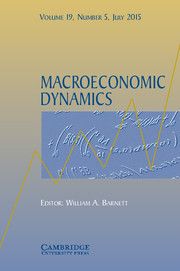
Switching to Good Policy? The Case of Central and Eastern European Inflation Targeters
The paper analyzes how actual monetary policy changed following the official adoption of inflation targeting in the Czech Republic, Hungary, and Poland and how it affected the volatilities of important macroeconomic variables in the years thereafter. To disentangle the effects of the policy shift from exogenous changes in the volatilities of these variables, a Markov-switching dynamic stochastic general equilibrium model is estimated that allows for regime switches in the policy parameters and the volatilities of shocks hitting the economies. Whereas estimation results reveal periods of high and low volatility for all three economies, the presence of different policy regimes is supported by the underlying data for the Czech Republic and Poland, only. In both economies, monetary policy switched from weak and unsystematic to strong and systematic responses to inflation dynamics. Simulation results suggest that the policy shifts of both central banks successfully reduced inflation volatility in the following years. The observed reduction in output volatility, on the other hand, is attributed more to a reduction in the size of external shocks.





